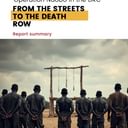
Ugandan President Yoweri Museveni’s (pictured) decision to sign the Anti-Homosexuality Act 2023 on May 29 has drawn widespread international criticism. The new law prescribes that people convicted of “aggravated homosexuality” may now be punished with a death sentence. Although same-sex relationships were already illegal in the country, the new law, which passed with the support of 341 out of 389 members of parliament, includes harsher punishments for “promoting” homosexuality and engaging in same-sex relations. Uganda last carried out an execution in 2005.
Government officials, international organizations, and business leaders around the world condemned the new law. U.S. Senator Ted Cruz tweeted that the law was “horrific & wrong,” noting that “Any law criminalizing homosexuality or imposing the death penalty for ‘aggravated homosexuality’ is grotesque & an abomination. ALL civilized nations should join together in condemning this human rights abuse.”
President Biden characterized the new law as “a tragic violation of universal human rights — one that is not worthy of the Ugandan people, and one that jeopardizes the prospects of critical economic growth for the entire country.” He noted an increase in “reports of violence and discrimination targeting Ugandans who are or are perceived to be LGBTQI+” since the introduction of the bill. Signed into law days prior to Pride Month in the U.S., Biden added that “we are considering additional steps, including the application of sanctions and restriction of entry into the United States against anyone involved in serious human rights abuses or corruption.”
The new law contemplates a prison term of up to 20 years for those who “promote” homosexuality, drawing concern from activists and organizations that provide treatment for AIDS. A joint statement by the leaders of the Global Fund, UNAIDS and PEPFAR stated that “Uganda’s progress on its HIV response is now in grave jeopardy. The Anti-Homosexuality Act 2023 will obstruct health education and the outreach that can help end AIDS as a public health threat. The stigma and discrimination associated with the passage of the Act has already led to reduced access to prevention as well as treatment services…”
Ugandan human rights lawyer Adrian Jjuuko called the law unconstitutional. “By criminalizing what we call consensual same-sex activity among adults basically goes against key provisions of the constitution including violating the rights to equality and non-discrimination under article 20 and 21 of the constitution. It also violates the right to dignity which is under article 24 of the constitution,” he said.
This is not the first time Uganda has passed a law criminalizing same-sex relationships. Initially proposed in 2009 and passed in 2013, the “Kill the Gay Act,” which was then rejected by the Constitutional Court in 2014 on procedural grounds, included a life sentence for aggravated homosexuality, though a death sentence was originally proposed. Under the 2023 Act, the charge of “aggravated homosexuality” is punishable by death and includes spreading HIV through same-sex relations, rape, and statutory rape, as well as for those deemed “serial offenders.”
Spokesperson for the United Nations Secretary-General Antonio Guterres said he was “deeply concerned” at the new law and called upon the country to “fully respect its international human rights obligations, in particular the principle of non-discrimination and the respect for personal privacy, irrespective of sexual orientation and gender identity.” United Nations Human Rights tweeted that they were “appalled that the draconian and discriminatory anti-gay bill is now law. It is a recipe for systematic violations of the rights of LGBT people & the wider population.” Earlier in February, the Ugandan government notified the UN High Commissioner for Human Rights (OHCHR) Country office that their mandate would not be renewed beyond the current term.
Uganda is not alone in criminalizing homosexuality. According to Human Dignity Trust, 11 countries have same-sex relations punishable by death: Afghanistan, Brunei, Iran, Mauritania, Nigeria, Pakistan, Qatar, Saudi Arabia, Somalia, the United Arab Emirates and Yemen. At least six of the 11 countries mandate the death penalty, while the other five have death as a potential punishment.
Abdi Latif Dahir, Ugandan President Signs Anti-Gay Law That Includes Death Penalty as a Punishment, The New York Times, May 29, 2023; Press Release, Statement from President Joe Biden on the Enactment of Uganda’s Anti-Homosexuality Act, The White House, May 29, 2023; Uganda enacts harsh anti-LGBTQ law including death penalty, Reuters, May 29, 2023; Factbox: Global firms in Uganda face LGBTQ conundrum, Reuters, May 29, 2023; Press Release, Joint Statement by the Leaders of the Global Fund, UNAIDS and PEPFAR on Uganda’s Anti-Homosexuality Act 2023, May 29, 2023; Uganda: President’s approval of anti-LGBTI Bill is a grave assault on human rights, Amnesty International, May 29, 2023; CCDPW Joins African Human Rights Defenders in Condemning Uganda’s Deadly Anti-Homosexuality Act, Center on the Death Penalty Worldwide, May 30, 2023; Anti-LGBTQ law ‘unconstitutional’ — Ugandan lawyer, Yahoo, May 29, 2023; Méline Szwarcberg, Recontextualizing the threat of death penalty for homosexuality in Uganda, World Coalition Against the Death Penalty, May 2, 2023; Statement attributable to the Spokesperson for the Secretary-General – on Uganda, UN, May 30, 2023; Uganda says it will not renew mandate of UN human rights office, Al Jazeera, February 8, 2023


